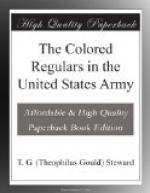Volunteer Cavalry, and being utterly exhausted, I was
obliged to lie down. Soon after, Captain
Mills, adjutant-general of Second Brigade, Cavalry
Division, came up to where I was and placed me
in command of Troop K, First United States Cavalry,
whose officers were wounded. I then marched
them forward on the road to where General Wheeler
was sitting, and received orders from Colonel
Wood, First Volunteer Cavalry, to remain until
further orders and make no further advance.
Directly afterwards, learning the action was
over, I reported back to General Young, and received
orders to remain camped with the First Cavalry
Squadron, where the action had closed. In
the meantime, I should have stated that I found
the principal part of my troop and collected
them and left them under the first sergeant, when
I went back to receive orders. So far as
I know, and to the best of my knowledge, the
men of my troop acted with the greatest bravery,
advancing on an enemy who could not be seen,
and subjected to a severe and heavy fire at each step,
which was only rendered ineffective to a great
degree by the poor marksmanship of the enemy,
as many times we were in sight of them (I discovered
this by observation after the engagement) while
we could see nothing. We were also subjected
to a severe reverse fire from the hills in our right
rear, several men being wounded by this fire.
Throughout the fight the men acted with exceptional
coolness, in my judgment. The casualties
were: Privates Russell, Braxton and Morris,
severely wounded; Privates F.A. Miller,
Grice, Wheeler and Gaines, slightly wounded,
i.e.,
less severely. None killed.
Very respectfully,
HENRY O. WILLIARD.
June 24, 1898.
Troop B, Tenth Cavalry,
during action near La Guasima,
Second Lieutenant, Tenth
United States Cavalry, Commanding.
Troop I of the Tenth Cavalry was commanded by First
Lieutenant R.J. Fleming with Second Lieutenant
A.M. Miller. This troop moved to the right
and wedged in between B Troop and the right of the
First Cavalry. Lieutenant Fleming discovered
the enemy posted on the high ridge immediately in
front of his troop, and also extending to his right,
in front of B Troop. Moving his troop a little
to the right so as to secure room to advance without
coming in contact with the First Cavalry, he then
directed his course straight toward the hill on which
he had located the enemy. The advance was made
with great caution, the men seeking cover wherever
possible, and dashing across the open spaces at full
run. Thus they moved until the base of the steep
part of the hill was reached. This was found
very difficult of ascent, not only because of the
rugged steepness, but also on account of the underbrush,
and the sharp-leaved grass, the cacti and Spanish bayonet,
that grow on all these hillsides. Paths had to
be cut through these prickly obstructions with knives
and sabres. Consequently the advance up that




